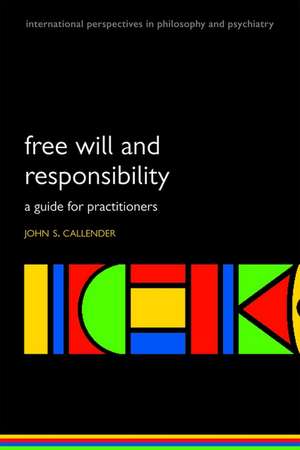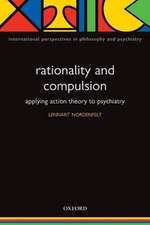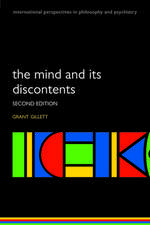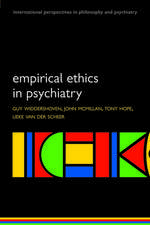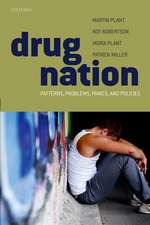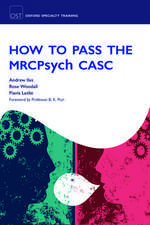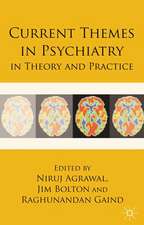Free will and responsibility: A guide for practitioners: International Perspectives in Philosophy & Psychiatry
Autor John S. Callenderen Limba Engleză Paperback – 28 apr 2010
Din seria International Perspectives in Philosophy & Psychiatry
- 5%
 Preț: 552.58 lei
Preț: 552.58 lei - 13%
 Preț: 322.49 lei
Preț: 322.49 lei - 24%
 Preț: 542.84 lei
Preț: 542.84 lei - 24%
 Preț: 541.08 lei
Preț: 541.08 lei - 23%
 Preț: 476.22 lei
Preț: 476.22 lei - 23%
 Preț: 543.69 lei
Preț: 543.69 lei - 23%
 Preț: 498.95 lei
Preț: 498.95 lei - 23%
 Preț: 544.39 lei
Preț: 544.39 lei - 24%
 Preț: 471.81 lei
Preț: 471.81 lei - 23%
 Preț: 413.41 lei
Preț: 413.41 lei - 23%
 Preț: 475.08 lei
Preț: 475.08 lei - 18%
 Preț: 364.04 lei
Preț: 364.04 lei - 18%
 Preț: 516.69 lei
Preț: 516.69 lei - 24%
 Preț: 458.13 lei
Preț: 458.13 lei - 23%
 Preț: 375.59 lei
Preț: 375.59 lei - 14%
 Preț: 327.50 lei
Preț: 327.50 lei - 23%
 Preț: 465.20 lei
Preț: 465.20 lei - 28%
 Preț: 481.03 lei
Preț: 481.03 lei - 23%
 Preț: 383.99 lei
Preț: 383.99 lei - 28%
 Preț: 424.71 lei
Preț: 424.71 lei - 24%
 Preț: 540.23 lei
Preț: 540.23 lei - 27%
 Preț: 340.88 lei
Preț: 340.88 lei - 14%
 Preț: 560.55 lei
Preț: 560.55 lei - 22%
 Preț: 578.19 lei
Preț: 578.19 lei - 23%
 Preț: 365.13 lei
Preț: 365.13 lei - 41%
 Preț: 294.77 lei
Preț: 294.77 lei - 27%
 Preț: 341.49 lei
Preț: 341.49 lei - 27%
 Preț: 432.12 lei
Preț: 432.12 lei - 19%
 Preț: 413.64 lei
Preț: 413.64 lei - 14%
 Preț: 482.19 lei
Preț: 482.19 lei - 23%
 Preț: 510.02 lei
Preț: 510.02 lei - 20%
 Preț: 592.34 lei
Preț: 592.34 lei - 23%
 Preț: 442.80 lei
Preț: 442.80 lei - 19%
 Preț: 323.05 lei
Preț: 323.05 lei - 25%
 Preț: 522.30 lei
Preț: 522.30 lei - 19%
 Preț: 403.13 lei
Preț: 403.13 lei - 19%
 Preț: 456.39 lei
Preț: 456.39 lei - 23%
 Preț: 384.56 lei
Preț: 384.56 lei - 14%
 Preț: 494.81 lei
Preț: 494.81 lei - 19%
 Preț: 528.27 lei
Preț: 528.27 lei - 17%
 Preț: 475.11 lei
Preț: 475.11 lei - 14%
 Preț: 386.21 lei
Preț: 386.21 lei - 24%
 Preț: 381.69 lei
Preț: 381.69 lei - 23%
 Preț: 393.35 lei
Preț: 393.35 lei - 27%
 Preț: 327.31 lei
Preț: 327.31 lei
Preț: 566.67 lei
Preț vechi: 779.19 lei
-27% Nou
Puncte Express: 850
Preț estimativ în valută:
108.47€ • 117.86$ • 91.17£
108.47€ • 117.86$ • 91.17£
Carte tipărită la comandă
Livrare economică 09-15 aprilie
Preluare comenzi: 021 569.72.76
Specificații
ISBN-13: 9780199545551
ISBN-10: 0199545553
Pagini: 406
Dimensiuni: 159 x 234 x 21 mm
Greutate: 0.61 kg
Editura: OUP OXFORD
Colecția OUP Oxford
Seria International Perspectives in Philosophy & Psychiatry
Locul publicării:Oxford, United Kingdom
ISBN-10: 0199545553
Pagini: 406
Dimensiuni: 159 x 234 x 21 mm
Greutate: 0.61 kg
Editura: OUP OXFORD
Colecția OUP Oxford
Seria International Perspectives in Philosophy & Psychiatry
Locul publicării:Oxford, United Kingdom
Recenzii
This is a fascinating, well-written book. The author explains difficult concepts such as free will, moral responsibility, and causal determinism clearly and thoroughly. The ideas he proposes are thought provoking and important.
This is an absorbing book, well written and lucid. Its clarity is borne of the authors keen sense of the issues and a prodigious knowledge of the philosophical literature concerning morality...John Callender has produced a rich and useful torch in the often dark and confusing world of moral responsibility within mental health.
This book is a real treat. John Callender offers an engaging and rigorous account of how science and morality meet, addressing important issues which should be thought about and discussed well beyond academic circles.
"...this is an interesting and well-researched book. We believe that many sections of the text might be useful for undergraduate or graduate forensic classes in psychology, law and psychology, criminal justice, or criminal policy. They may also be of interest to other professionals involved with the legal system such as lawyers, judges, policy makers, and social workers. Forensic psychologists might refer attorneys to various sections of the book. The second half of the book might be particularly suitable for persons interested in or working in mental health and forensic fields." - PsycCRITIQUES, American Psychological Association
..a most illuminating treatise on the complex topic of free will and (moral) responsibility. - Professor Herschel Prins, ^ Medicine, Science and the Law^
This is an absorbing book, well written and lucid. Its clarity is borne of the authors keen sense of the issues and a prodigious knowledge of the philosophical literature concerning morality...John Callender has produced a rich and useful torch in the often dark and confusing world of moral responsibility within mental health.
This book is a real treat. John Callender offers an engaging and rigorous account of how science and morality meet, addressing important issues which should be thought about and discussed well beyond academic circles.
"...this is an interesting and well-researched book. We believe that many sections of the text might be useful for undergraduate or graduate forensic classes in psychology, law and psychology, criminal justice, or criminal policy. They may also be of interest to other professionals involved with the legal system such as lawyers, judges, policy makers, and social workers. Forensic psychologists might refer attorneys to various sections of the book. The second half of the book might be particularly suitable for persons interested in or working in mental health and forensic fields." - PsycCRITIQUES, American Psychological Association
..a most illuminating treatise on the complex topic of free will and (moral) responsibility. - Professor Herschel Prins, ^ Medicine, Science and the Law^
Notă biografică
John Callender has been a consultant psychiatrist since 1986 and Medical Director of Grampian Psychiatric services since 1991. He is an Honorary Clinical Senior Lecturer, Medical School, University of Aberdeen. He has been interested in the philosophy of psychiatry for the past twelve years. He is a member of the Grampian Clinical Ethics Committee and the North of Scotland Research Ethics Committee. He has published papers on ethics and aesthetics in relation to psychiatry in the Journal of Medical Ethics, Clinical Psychology and Psychotherapy, and Philosophy, Psychiatry and Psychology.
